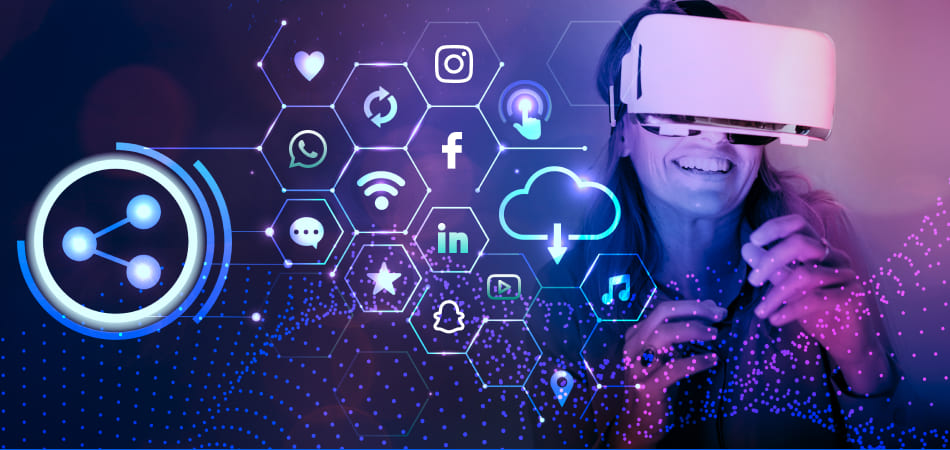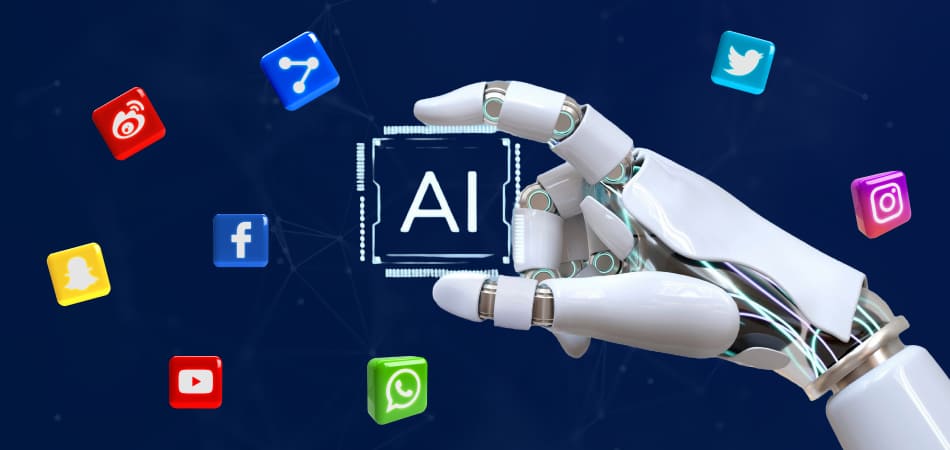Introduction
In the fast-paced world of digital marketing, staying ahead of the curve is crucial for businesses looking to engage their audience and drive growth. One of the most transformative forces reshaping digital marketing is artificial intelligence (AI). AI is no longer a futuristic concept but a present-day reality that is revolutionizing how marketers create, distribute, and optimize content. This blog will delve into the various ways AI is changing digital marketing, providing practical insights and examples to help businesses leverage this powerful technology.
Understanding AI in Digital Marketing
What is AI?
Artificial intelligence refers to the simulation of human intelligence processes by machines, particularly computer systems. These procedures include self-correction, reasoning (using the rules to arrive at approximate or definitive conclusions), and learning (acquiring knowledge and rules for applying it). In the context of digital marketing, AI encompasses a wide range of technologies, including machine learning, natural language processing (NLP), and predictive analytics.
The Role of AI in Digital Marketing
AI is transforming digital marketing by automating tasks, enhancing customer experiences, and providing deeper insights through data analysis. From chatbots and content creation to personalized marketing and predictive analytics, AI tools are becoming integral to marketing strategies.
AI-Powered Content Creation
Automating Content Generation
AI tools like OpenAI’s GPT-4 can generate high-quality content in seconds. These tools analyze vast amounts of data to produce articles, blog posts, and social media updates that are not only coherent but also tailored to specific audiences.
Enhancing Creativity
AI fosters creativity in addition to automating tasks. AI-powered solutions can make recommendations for fresh material based on user interests and popular subjects. For instance, tools like BuzzSumo and HubSpot’s Content Strategy use AI to analyze content performance and recommend new topics that are likely to resonate with your audience.
Case Study: Automated Content Creation
One prominent example of AI in content creation is the Associated Press (AP), which uses AI to generate earnings reports. This automation has allowed AP to increase the volume of their reports by tenfold without compromising quality .
Table: AI Tools for Content Creation
| Tool | Function | Benefits |
| GPT-4 | creates content for blogs, social media, and publications. | Fast, high-quality content generation |
| BuzzSumo | Analyzes content performance and suggests new topics | Data-driven content ideas |
| HubSpot Strategy | Recommends content topics based on audience interests | Enhanced content relevance |
Personalization and Customer Experience
Personalized Content Delivery
AI allows marketers to deliver personalized content. By analyzing user data and behavior, AI can predict what content will be most relevant to each user and deliver it at the right time. Engagement and conversion rates are raised by this customization.
Chatbots and Virtual Assistants
Chatbots and virtual assistants powered by AI are transforming customer service. These tools can handle a wide range of queries, provide instant responses, and guide users through their customer journey. This not only improves user experience but also frees up human resources for more complex tasks. 70% of white-collar workers will engage with conversational platforms on a daily basis by 2022, predicts Gartner.
Predictive Analytics
Using historical data and artificial intelligence, predictive analytics makes predictions about future behavior. Marketers may utilize this to make data-driven decisions, optimize advertising, and predict customer demands. AI can, for instance, identify the things that a consumer is most likely to purchase next and recommend them in tailored emails or advertisements.
Case Study: Personalization in E-commerce
AI is used by e-commerce behemoth Amazon to customize product recommendations. By analyzing purchase history and browsing behavior, Amazon’s AI suggests products that customers are likely to be interested in, significantly boosting sales and customer satisfaction. McKinsey claims that Amazon’s recommendation system accounts for 35% of its total revenue.
Table: AI Tools for Personalization and Customer Experience
| Tool | Function | Benefits |
| Personalization Engines | Tailors content delivery based on user behavior | Increased engagement and conversion rates |
| Chatbots | Automates customer service interactions | Instant responses, improved user experience |
| Predictive Analytics | Forecasts customer behavior and trends | Data-driven decision making |
Optimizing Marketing Campaigns
AI-Driven SEO
For online visibility, search engine optimization, or SEO, is essential. AI tools like Clearscope and MarketMuse analyze top-performing content to identify keywords and topics that will improve search rankings. These tools also provide insights into how to optimize existing content for better performance.
Ad Targeting
AI enhances ad targeting by analyzing user data to identify the best audience for your ads. This ensures that your ads are shown to users who are most likely to be interested in your products or services, improving the efficiency and ROI of your ad spend. According to eMarketer, AI-powered programmatic advertising will account for 86.2% of all digital display ads by 2023 .
Performance Analysis
AI tools can analyze the performance of marketing campaigns in real-time, providing insights into what is working and what is not. This allows marketers to make adjustments on the fly and optimize their strategies for better results.
Case Study: AI in SEO
The New York Times uses AI to optimize their headlines for search engines. By analyzing which headlines drive the most traffic, they can create SEO-friendly headlines that attract more readers.
Table: AI Tools for Campaign Optimization
| Tool | Function | Benefits |
| Clearscope | Analyzes top-performing content for SEO | Improved search rankings |
| MarketMuse | Identifies keywords and optimization opportunities | Enhanced content performance |
| Ad Targeting Tools | Analyzes user data for targeted advertising | Efficient ad spend, higher ROI |
Enhancing Social Media Marketing
Content Scheduling and Management
AI tools like Hootsuite and Buffer allow marketers to schedule and manage social media posts across multiple platforms. AI is used by these systems to identify the optimal posting times for optimum interaction.
Social Listening
AI-powered social listening tools like Brandwatch and Sprout Social analyze social media conversations to identify trends, monitor brand sentiment, and track competitor activity.This enables marketers to react swiftly to trends and gain a deeper understanding of their consumer. According to a study by Salesforce, 80% of marketers say that AI-based social listening tools are critical for their strategies.
Influencer Marketing
AI can identify influencers who align with your brand values and have a significant impact on your target audience. Tools like Traackr use AI to analyze influencer performance and recommend the best influencers for your campaigns.
Case Study: Social Listening
Coca-Cola uses AI-powered social listening to monitor brand mentions and sentiment across social media. This allows them to respond to customer feedback in real-time and adjust their marketing strategies accordingly.
Table: AI Tools for Social Media Marketing
| Tool | Function | Benefits |
| Hootsuite | Schedules and manages social media posts | Consistent posting, increased engagement |
| Brandwatch | Analyzes social media conversations | Trend identification, brand sentiment analysis |
| Traackr | Identifies and analyzes influencers | Effective influencer partnerships |
AI in Email Marketing
Personalization and Segmentation
AI can analyze customer data to segment your email list and personalize your messages. This ensures that your emails are relevant to each recipient, increasing open and click-through rates.
Predictive Send Times
AI tools can predict the best times to send emails to each recipient based on their past behavior. Your emails are more likely to be opened and read as a result.
A/B Testing
AI can automate A/B testing by analyzing the performance of different email variations and selecting the best-performing version. This helps marketers optimize their email campaigns for better results.
Case Study: AI in Email Marketing
Retailer Sephora uses AI to personalize their email marketing. By analyzing customer data, Sephora sends personalized product recommendations and promotional offers, resulting in higher engagement and sales.
Table: AI Tools for Email Marketing
| Tool | Function | Benefits |
| Personalization Tools | Segments email list and personalizes messages | Higher open and click-through rates |
| Predictive Send Times | Predicts the best times to send emails | Increased email engagement |
| A/B Testing Tools | Automates A/B testing for email campaigns | Optimized email performance |
The Future of AI in Digital Marketing

Advanced AI Technologies
As AI continues to evolve, we can expect even more advanced technologies to emerge. Natural language generation (NLG) will improve content creation, making AI-generated content indistinguishable from human-written content. AI-powered video creation tools will become more sophisticated, allowing marketers to produce high-quality videos at scale.
Ethical Considerations
As AI becomes more prevalent in digital marketing, ethical considerations will become increasingly important. Marketers will need to ensure that their use of AI respects user privacy and avoids biases. Transparency in how AI is used and how data is collected and analyzed will be crucial.
Preparing for the Future
To stay ahead of the curve, marketers should start integrating AI into their strategies now. This involves investing in AI tools, upskilling their teams, and staying informed about the latest AI trends and technologies.
Case Study: Future Trends
A report by Gartner predicts that by 2025, 80% of emerging technologies will have AI foundations. Businesses that adopt AI early will have a competitive advantage in the digital marketing landscape.
Table: Future Trends in AI for Digital Marketing
| Trend | Description | Impact on Marketing |
| Natural Language Generation (NLG) | AI-generated content indistinguishable from human content | Enhanced content creation capabilities |
| AI-Powered Video Creation | Sophisticated tools for producing high-quality videos | Scalable video marketing |
| Ethical AI | Ensuring transparency and fairness in AI use | Trust and credibility with consumers |
Conclusion
Undoubtedly, artificial intelligence is changing the face of digital marketing. From automating content creation and personalizing customer experiences to optimizing marketing campaigns and enhancing social media strategies, AI offers a plethora of opportunities for marketers. By understanding and leveraging AI technologies, businesses can create smarter content, engage their audiences more effectively, and stay ahead of the competition. As AI continues to evolve, staying informed and adaptable will be key to harnessing its full potential in the dynamic world of digital marketing.




